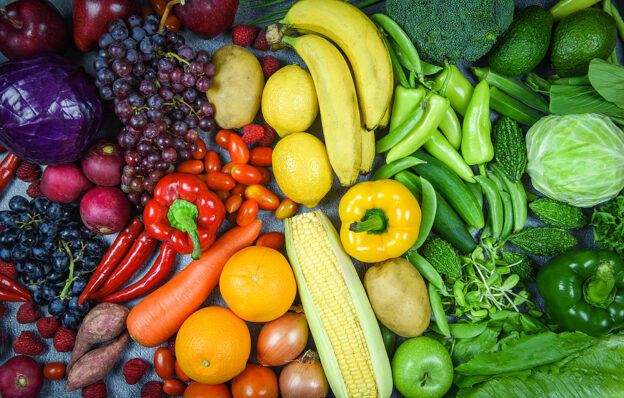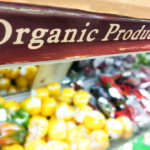By David Blyweiss, M.D., Advanced Natural Wellness
February 9, 2022
Over the years, the growing soil for our fruits and vegetables has been stripped of nutrients and and their microbiome. That’s because we screwed it up.
We put poisons, like pesticides and herbicides, into the soil. We focused on higher yields instead of leaving fields unplanted for a season or two to allow them to renew their soil. We’ve failed to rotate crops the way we’re supposed to….basic knowledge was ignored or forgotten. “Six years you shall sow your land and gather in its produce, but the seventh year you shall let it rest and lie fallow.
In the last 60-80 years, these degenerative agricultural practices have been wiping the nutrients and life out of our soil so that plants can’t pull what we and they need from a robust and recycling earth environment into their roots ,– and into the fruits and vegetables we’re eating. Soil is not just a matrix to retain minerals and keep plants in one place. Evolving research indicates that the soil microbiome may well have an even more positive effect on our health than previously thought. Remember the saying, (paraphrasing here) “ Kids need to eat their pound of dirt” to be healthy?
On top of that, we’re losing topsoil at alarming rates. This is the carbon-rich soil that stores the water and the nutrients and microbiome crops need. But here in the United States we are losing soil ten times faster than it can be renewed. In fact, about 35% of the Corn Belt has lost its topsoil completely. Some of this is due to environmental erosion, but certain farming practices can contribute to it.
What does this mean for you?
Open your arteries, improve blood flow for a new health miracle...
Did you know your circulatory system has over 60,000 miles of arteries, veins and other blood vessels, if stretched end to end?
But as you age, your blood vessels undergo changes, which may cause them to stiffen, thicken and get clogged.
GOOD NEWS! Doctors have now identified a “Miracle Molecule” inside your arteries that helps OPEN your arteries and IMPROVE blood flow.
It’s what Dr. Valentin Fuster calls it, "One of the most important discoveries in the history of cardiovascular medicine."To you, that means...
- Healthy blood pressure
- Sharper mind and memory
- Skyrocketing energy and muscular strength
- Increased pleasure and passion in the bedroom
- Improved circulation to every cell and organ in your body
Go here to discover a new natural way to significantly boost the levels of this miracle molecule in YOUR body NOW!
It means when you bite into a carrot, you’ll get about 75% less magnesium and copper than your grandparents did. And you would have to eat 10 tomatoes to get the same amount of copper found in a single tomato in 1940.
So we’re not getting the same levels magnesium, copper, selenium, calcium, potassium and other micronutrients in our food that we used to. In fact, even if you’re eating plenty of fruits and vegetables, it’s nearly impossible to get all of the vitamins and minerals you need through diet alone these days.
You’ll Fare Better with Organic Foods
A lot of people still think buying organic is a waste of money. But while it might cost a little bit more, it will most certainly have a healthier effect on your body.
Organic foods not only have a healthier vitamin and mineral profile, they are also extremely higher in antioxidants than commercial fruits and vegetables.
I’m talking about compounds like flavanones, anthocyanins and stilbenes that slash inflammation, help prevent cells from mutating and protect against cancer.
Are You Suffering From...
- Love handles and a pot belly
- Romance that isn't what it used to
- Forgetfulness and inattention
- Low (or no) strength and endurance
- A sex drive that's shifted into neutral...or worse
If so...you may have Mature Male Burnout. Click here to discover more about this unique condition and what you can do about it.
And get this…
Compared to commercial fruits and vegetables, organic produce contains up to 69% more flavanones, 51% more anthocyanins and 28% more stilbenes.
And here’s another thing. Commercial fruits and veggies are higher in toxic cadmium. And while you can’t avoid cadmium altogether, you can limit your exposure to it by eating organic foods.
The fact is, organic food crops contain about half as much cadmium as levels found in commercial crops. This is an extremely important point, because cadmium is accumulated throughout your lifetime. And it can be extremely toxic. Even low levels are associated with kidney damage and a decrease in bone density.
This is a great reason to choose organic over conventional.
But in today’s toxic environment and all of the stressors we’re exposed to, it’s still a good idea to supplement with a multivitamin.
Filling in the Nutritional Gaps
The micronutrients crops obtain from the soil are essential to your body. They help it produce enzymes, hormones and other substances. They’re important to your bone health, immune function and fluid balance. They fight and prevent disease.
If you can’t get enough of them from your food, it’s vital to fill in that shortcoming with a good multivitamin. It needs to be high quality. That means you want to pass on the gummy versions.
Instead, look for a well-rounded whole food multivitamin that includes vitamins, minerals, antioxidants and phytonutrients. And don’t be put off by those multivitamins that require taking six or more a day. When you pack a lot of quality nutrients together, they usually won’t fit into a single pill. The more power you put into them; the more capsules will be necessary. If you’re more comfortable taking less than the recommended dosages, but consistently, that’s still so much better than not taking them at all.
But you probably don’t want to slug six or more pills down all at once. So I suggest dividing them up between your meals. This will give you sustained nutritional safety nets throughout the day.
When you choose organic and fill in the gaps with a multivitamin, you’ll have a much better chance of meeting your body’s nutritional needs for more energy, mental clarity and protection from disease.
SOURCES:
Pimentel, D. Soil Erosion: A Food and Environmental Threat. Environ Dev Sustain. 2005;8(1):119–137.
Thaler EA, Larsen IJ, Yu Q. The extent of soil loss across the US Corn Belt. Proc Natl Acad Sci U S A. 2021 Feb 23;118(8):e1922375118.
Thomas D. The mineral depletion of foods available to us as a nation (1940-2002)–a review of the 6th Edition of McCance and Widdowson. Nutr Health. 2007;19(1-2):21-55.
Barański M, Srednicka-Tober D, Volakakis N, Seal C, Sanderson R, Stewart GB, Benbrook C, et al. Higher antioxidant and lower cadmium concentrations and lower incidence of pesticide residues in organically grown crops: a systematic literature review and meta-analyses. Br J Nutr. 2014 Sep 14;112(5):794-811.






